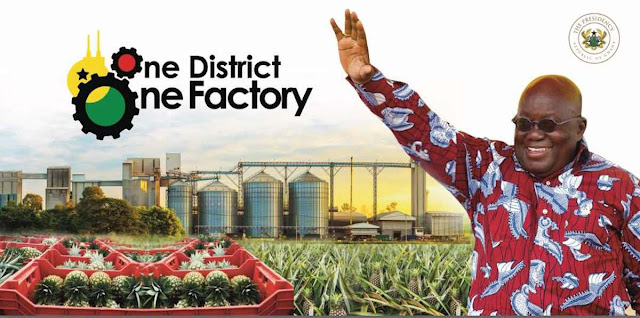According to reports, thirty-five companies have successfully gone through documentation processes to establish viable factories under the “One District, One Factory’ (1D1F) policy in the Central Region.
The factories are expected to engage in commercial processing and production of salt, bricks and tiles, plywood tiles, starch, oil palm, bamboo, tomatoes paste and cassava processing into industrial ethanol among others.
Mr Charles Nkrumah, an Official in-change of the programme in the Region who disclosed this at a Town Hall Meeting held at Ajumako-Besease on Tuesday, said the factories would be established in all the 20 administrative districts of the region.
Giving details, he said “I can tell you on authority that most of the companies are almost ready to commence commercial production of various products and services by December 2018. Some districts will have more than one factory.”
At the national level, he announced that more than 309 factories in 216 districts will soon begin operations with employment capacity of 277,549 qualified energetic youth and varied professionals to better their standards of living.
At the Regional level, he said there were 13 in Western, Volta 24, Upper East, 8, Upper West 4, Northern 18, Greater Accra 46, Eastern 53, Ashanti 74, Brong Ahafo 34, and 35 in the Central Region.
Mr Nkrumah said Government’s flagship programme of industrialisation was aimed at creating congenial business environment to attract investors and create jobs.
That, he explained was in line with Government’s vision to industrialise the country by identifying the economic potentials of each district through qualitative value addition to those resources.
“Our region is blessed with a lot of riches in the form of natural resources, but the challenge is how to turn these riches into wealth for the benefit of the people and that is exactly what government seeks to do,” he said.
To hasten the pace of industrialisation in the Region, Mr Nkrumah expressed Government’s readiness to partner private sector, interest groups and individuals to ease the processes to create jobs for the teeming unemployed youth.
Reverend Ransford Kwesi Nyarko, the District Chief Executive on his part repeated the eagerness of the Nana Addo led-administration to shift the paradigm from promises to action to maintain the confidence reposed in him by the people.
The government has moved away from the systems where the vulnerable and those in rural Ghana were excluded from the development process, but rather charting a path that aimed at focusing on their development needs, he said.
On 1D1F, he announced that the Assembly in collaboration with its partners would soon begin the construction of a cassava processing factory under the 1D1F industrialisation drive.
According to him, the sheer abundance of quantities of raw cassava and willingness of the farmers to support it was the inspiration to set-up the factory to process cassava into flour and other products to create employment for the youth.
He also spoke of plans to establish other factories with the support of the private sector and assured that the Assembly would continue to work hard to woo more investors to establish businesses in the area to create wealth and jobs for the people.







